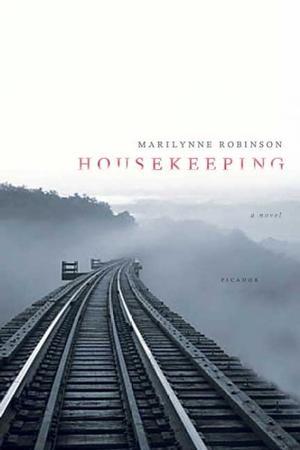 Marilynne Robinson, Housekeeping (1980)
Marilynne Robinson, Housekeeping (1980)
Marilynne Robinson is one of these writers I have always been afraid of. Every time she’s mentioned, people speak about The Great American Novel, and I’m always convinced I won’t “get” it, and only Americans can “get” them. Another of these writers is Annie Dillard. I have started numerous times Pilgrim at Tinker Creek and never went beyond page 10. One day I’ll come back to it, I know, so many people have told me that I am missing out, but… intimidated I am.
I borrowed Housekeeping from our new library (more on that later!), and quite frankly I mistook it for Home, of which I had heard raving reviews from people who don’t only read highbrow books (I honestly don’t remember who especially). I didn’t know that Housekeeping was her first novel. I didn’t know what it was about. I didn’t know it had been published in 1980. In Modern Mrs. Darcy website, My name is Lucy Barton was recommended for people who love Marilynne Robinson, so why not try it the other way round ?
The first sentence made me pause, so pregnant it is with hidden messages :
My name is Ruth. I grew up with my younger sister, Lucille, under the care of my grandmother, Mrs. Sylvia Foster, and when she died, of her sisters-in-law, Misses Lily and Nona Foster, and when they fled, of her daughter, Mrs. Sylvia Fisher.
Wow. This packs so much into one single sentence. The orphans (why? how?), the absence of men, the family relationships, the formality and distances of Mrs., Misses, the conservatism (naming one’s daughter like the mother), the mystery of “when they fled”. I was hooked, and no longer intimidated!
The style is everything in this book. There are images that will stay with you for a long time, like that of a train that crashes into the cold lake, lost forever with the narrator’s grandfather in it. The pace is slow and nothing seems to happen, yet a lot goes on beneath the surface. I could never tell when the story is supposed to be set, or where it’s supposed to be. It could be in an imaginary place of fairy tales, but not the Disney version, the dark and sad ones, like Grimm or Andersen. It also reminded me of the melancholy witches of Neil Gaiman in The Ocean at the end of the lane.
The story is told by Ruth, and Ruth is all about her family’s past, and everything she says assumes a dreamlike quality. The writing is both simple and powerful, a bit like the Bible, so that everything happens feels like a myth or a metaphor.
At times the timeless story hit some hard places, especially when it incorporated some elements of reality, of normalcy. In particular, when Ruth’s sister Lucille decided to not follow Ruth and their quirky aunt Sylvie anymore, and when she decided to go to school and dress like a teenager and do what teenagers typically do; i.e. to conform and fit in, instead of staying on the margins of the town. When the village authorities showed up at Sylvia’s doorsteps trying to make her realize that Ruth had to lead a normal life and go to school. It was a hard landing from the dream to the reality for me, because deep down, I didn’t really “get” them and would rather identify with Lucille than with Ruth and Sylvie.
Still, the heartbreaking ending reconciled me with the whole novel when Ruth and Sylvie leave the village behind in a powerful scene and drift away across the country, hoping to find Lucille in Boston one day.